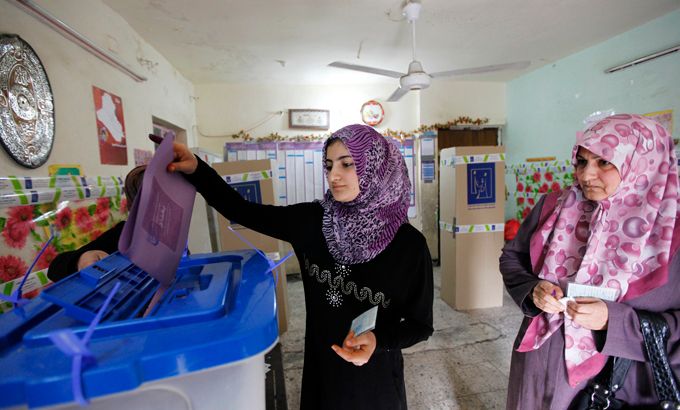Poll centre attacks mar Iraq provincial vote
Twelve out of 18 provinces vote in local elections, with security bolstered after deadly violence blights campaigning.

Iraqis have voted in the first provincial elections since US troops left the country in 2011, despite attacks on some polling centres across the country.
Four people were injured on Saturday after bombs and mortar rounds hit a voting station in Latifiya, south of Baghdad.
More explosions struck at least four other towns without any injuries or casualties reported, police officers told the Reuters news agency.
The results of Saturday’s local elections will not directly affect the shape of Iraq’s national government, but they will be an important indicator of support for Iraq’s political blocs heading into 2014 parliamentary elections.
The vote is a key test of the country’s stability in the face of a spike in attacks in recent days that have left more than 100 people dead.
Voting is taking place at more than 5,300 polling centres for members of provincial councils who will serve in 12 of Iraq’s 18 governorates.
An estimated 13.8 million Iraqis are eligible to vote for more than 8,000 candidates from 50 electoral blocs for 378 positions.
Streets deserted
The credibility of the provincial elections has come into question after attacks on candidates ahead of the polls left 14 dead.
I don't believe this election will provide a magic solution for the problems of Iraqis, and the problems in the country.
People were searched twice before they were allowed to enter polling stations and Iraqi security forces had a heavy presence in the area.
One-third of Iraq’s provinces, all of them mainly Sunni Arab or Kurdish, are not taking part after political disagreements prevented four provinces from holding the polls and authorities in two others said that security could not be ensured.
Only pre-approved vehicles were allowed on the streets, which were largely deserted except for police and soldiers.
The polls are seen as a gauge of the popularity of Prime Minister Nuri al-Maliki’s Shia-led government ahead of next year’s general election.
Major issues affecting voters such as poor public services and corruption have largely been ignored during the campaign.
Ihsan al-Shammari, a politics professor at Baghdad University, said a well-run vote with a high turnout could bolster Iraqi belief in democracy, a decade after US-led forces ousted Saddam Hussein, the former president who was later executed.
“The results will show the popularity of the various parties and, because of this, we see that party leaders are themselves leading campaigns,” Shammari said.
“I don’t believe this election will provide a magic solution for the problems of Iraqis, and the problems in the country.”
Violence rise
Iraqi forces were responsible for security on polling day. It was the first time they had been in charge without support from US or other international forces during elections since Saddam was toppled.
The interior ministry spokesman Brigadier General Saad Maan said that the government would use all its security resources to control the situation.
Violence in Iraq has fallen significantly since the height of its sectarian war.
However, it faces significant security challenges, mainly from Sunni groups linked to al-Qaeda who launch attacks in a bid to undermine confidence in the Shia-led government.
Provincial councils are responsible for nominating governors who take charge of the provinces’ administration, finances and reconstruction projects, and have sway over key local issues such as sewerage and other services.
Iraq’s police and military members cast their ballots last week. Electoral officials reported a turnout of 72 percent in that early voting.
Results are not expected for several days.